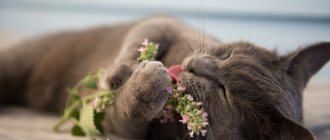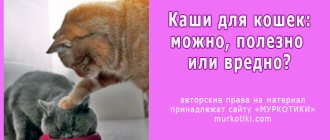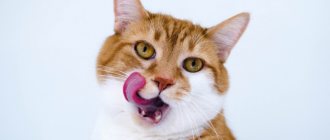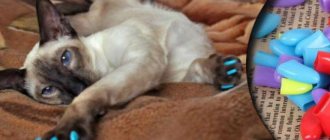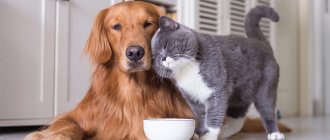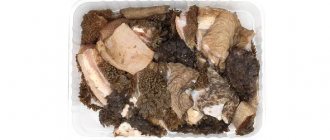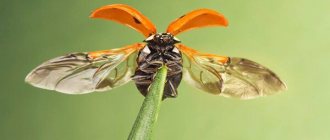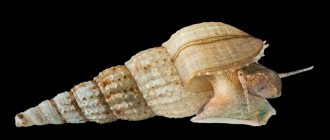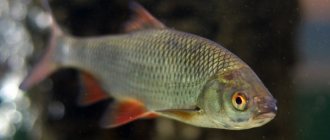Today on the Internet you can often see videos of people making fun of the behavior of cats under the influence of valerian. It may seem that many cats adore this tincture. Under its influence, cats seem to become inadequate in their behavior. A bottle of tincture becomes an object of pleasure and mania for the pet. When you try to take the tincture, you may encounter quite serious aggression from your furry pet. The Internet is filled with funny videos on the topic of cats and valerian, but let's figure out whether the sedative medicine is harmless for cats. On our veterinary website we have collected facts about the effects of the tincture.
What changes are happening?
As soon as a feline smells a medicinal herb or drinks a little tincture, a change in its behavior occurs literally immediately. Any domestic cat can turn into a real robber, and along the way he can damage the house by breaking a vase, scratching the wallpaper, tearing curtains, etc.
You shouldn't be surprised by this behavior; it's normal. Your pet may tear and bite various objects. Rarely, cats may even urinate in corners. Simply put, valerian can be safely called a narcotic substance for any cat. Although this is a medicinal plant, it can cause hallucinations in cats, which will definitely not lead to any good.
How does valerian affect cats?
global $ads_google;
//data-ad-slot=”2475549904″ $ads_google = empty($ads_google) ? false : true; ?> if ($ads_google == false) {?> $ads_google = true; ?> } ?> If you offer a cat drops of valerian and observe it, you can conduct a whole study. Valerian for cats is a special remedy: it doesn’t matter what kind of cat lives in the house - even the sweetest quiet one can be compared to a noisy rowdy of a night bar in a couple of seconds.
The effect of the drug on different pets is different: some cats will howl, while others will simply roll meaninglessly on the floor for a long time, cats may suddenly begin to mark corners, and a lazy pet will suddenly begin to climb up the wallpaper and curtains.
Since the medicine acts like a drug, it is not surprising that animals experience intoxication, hallucinations and disorientation in space. Sometimes cats feel like house lions and rush at an invisible opponent, or rush around as if running away from someone. It doesn’t matter whether the cat was old, sedentary or nimble: in any case, the behavior of the intoxicated creature will be different.
Animals change before our eyes: the hitherto cute four-legged purr suddenly begins to show aggression, seems angry, insane, and now he is rushing to bite his beloved owner.
Some pussies, on the contrary, become sluggish: even their gait becomes sluggish and unsteady. Such cats fall asleep quickly and dream for a long time. This behavior is also characteristic of secondary behavior for those animals who, after smelling valerian, first behaved violently and went crazy.
Does this have a bad effect on the body?
Cats can easily become addicted to the tincture, it is a truly powerful herb for them. Valerian root is infused with alcohol. Representatives of felines cannot resist alcohol, which means that they can quickly become intoxicated.
It is highly recommended to hide valerian from your pet. You shouldn't give it to your cat for fun. Alcohol is harmful to the human body, and it is even more dangerous for animals. Valerian mixed with alcohol can seriously harm your animal, and alcohol in the medicine can cause:
- stomach ulcer;
- kidney disease (renal failure);
- dullness of actions, motor activity;
- liver disease.
A list of such diseases will definitely not bring any good to your pet, be careful with it.
Why cats love valerian
Zoologists have been studying the love of cats for valerian: anyone who has ever seen how this plant affects purring cats will definitely want to know where this obsession comes from. So scientists have studied this issue. It turned out that there is a similarity between the aroma of weed and the pheromones of an adult cat. Cats, smelling such a smell, come under the influence of special substances, as a result we see the manifestation of an altered hormonal and emotional state of animals. Since the central unequal system is affected, cats experience disturbances in the perception of reality. For an outside observer, this looks like inappropriate behavior of a cat, but for the animal it is a real drug. And since the drug causes intoxication, meowing creatures like this effect: you just need to drop a few drops of valerian onto any object, and the cat will immediately begin to show super-persistent attention to the thing.
There is also a version that valerian root is a feline aphrodisiac - a pronounced reaction to it appears in cats after puberty and during estrus.
There are exceptions
However, despite all the negative aspects, there are cases when a professional veterinarian himself recommends the use of valerian for your animal. These are very rare cases, and the dosage is very small.
The reason for prescribing this medicine to cats may be heart problems or gastrointestinal problems. In such cases, the medicine has a positive effect on the body, but only a minimal dose can be given. Moreover, the veterinarian himself sets the dosage for cats, and valerian can only be used in the form of drops. Health to you and your pets!
Valerian alternative
There is a safer way for felines to relax: whiskers simply go crazy on catnip.
Catnip is officially called ivy bud, and in common people - catnip. The tall herbaceous plant invariably arouses interest among catfish, both domestic and their wild counterparts. Neither a lion, nor a cougar, nor a tiger is able to ignore the catnip that they love so much. Animals smell catnip, get excited, rush to the bush, and act like crazy: it is by no means a sedative.
It’s not scary that the cat chewed a little bush, but if he obviously ate the plant from the full breadth of the cat’s soul, then severe poisoning is possible. Sometimes catnip is added in small doses to cat toys, scratching posts, and beds.
What is special about the plant and its attractiveness to cats?
Valerian officinalis is a perennial herb with thick stems and umbellate inflorescences. All its parts contain a large amount of bioflavonoids and essential oils. The massive rhizome is used in medicine and herbal medicine. It is rich in glycosides, bioactive acids, amines and enzymes.
In humans, valerian extract or infusion acts as a sedative. It is taken as part of complex therapy for cardiovascular diseases, pathologies of the nervous system, for sleep disorders and in a state of increased stress.
Valerian has the opposite effect on cats. The animal becomes excited, the pupils of the eyes dilate, and the heartbeat quickens. After licking the tincture or chewing a little dry plant, pets experience strong euphoria, they spin around the floor and show genuine pleasure.
However, teenage kittens, older cats, and those who have been doped too much may suffer from hallucinations, panic attacks, and uncontrollable aggression.
In fact, valerian acts like a drug on cats. They react to small doses in characteristic three stages:
- agitation and excessive activity;
- inhibition and sleep;
- withdrawal symptoms accompanied by lethargy.
Animals experiencing pain due to chronic diseases or intestinal spasms due to digestive disorders receive relief. In addition, active neurostimulants in valerian can awaken the sexual instinct, because their smell is similar to cat pheromones. This also explains the fact that males are more sensitive to the effects of the plant than females.
If a pet receives it systematically, it develops a habit. The reason for this is the substance – actinidin, which is a powerful stimulator of the receptors of the pleasure center in the cat’s brain. He will increasingly demand a new dose and increase the amount. The periods of excitement will be shorter and shorter, and sleep and withdrawal symptoms will be more difficult and painful. The owners, indulging the pet's desires, turn him into a drug addict. The once cheerful and well-groomed animal loses interest in games, communication, food, and looks unkempt and sick.
Well-mannered and affectionate animals behave inappropriately, attack their owners, damage furniture, and relieve themselves wherever they want.
Exceeding the dosage and abuse will inevitably lead to severe coma and death of the cat. There is no single lethal dose of valerian. Each animal has its own threshold of susceptibility; some can suffer a massive stroke, heart attack or respiratory arrest and die from just three tablets.
Dosage
In certain cases, a cat can use valerian. The main thing in such a situation is not to overdo it with the dose of medicine. The maximum dose for a cat is a couple of drops, which can be placed on the cat’s nose or diluted in a small amount of water and given to drink.
Valerian tablets, in addition to the extract, contain a large amount of unnecessary chemicals, and therefore their effect will be zero . In addition, chemicals can seriously harm the animal. The conclusion from this is that cats should not be given valerian tablets.
© shutterstock
Experiments with valerian
Most owners do not see any danger in their cats consuming valerian. After consumption, the cat “has fun” and behaves inappropriately. When the euphoria ends, loss of strength and lethargy are observed. During this period, the animal can easily fall asleep for several hours.
© shutterstock
Experiments with valerian are not recommended to be repeated, as it is addictive to the cat. Without it, the cat begins to experience withdrawal symptoms, which affects its mood and behavior. Males are especially affected by this: they associate the smell of the medicine with the smell of cat fluids. Valerian has no effect on kittens under four months of age, since they are not sexually mature. It only affects those individuals who have passed the stage of puberty.
Valerian as a medicine
However, valerian does not always bring only harm. Sometimes it can be used for medicinal purposes, for example, for :
- Heart failure;
- Spasms in the stomach and intestines;
- Digestive problems;
- Excessive passivity of the cat.
Remember that you cannot prescribe medicine to your cat yourself. The benefits of taking valerian are much less than the harm. Before use (regardless of the diagnosis), consultation with a veterinarian is necessary.
© shutterstock
Why does it affect behavior?
Valerian officinalis contains essential oils, a mixture of which causes a surge of hormones in a cat, reminiscent of the smell of a representative of the opposite sex , ready for procreation. This fact confirms that cats practically do not react to the smell of valerian, and kittens treat it with indifference or disgust.
The substances contained in valerian are addictive in cats, so after trying it once, the cat practically becomes a drug addict, ready to do anything to get a dose of the potion. And having even received a few drops of it, he gets drunk and begins to behave accordingly. Some cats begin to misbehave , purr and jump, others simply need to fight, and they often choose their owner as an opponent. The state of intoxication gives way to exhaustion, after which the animal can sleep for several hours.
Valerian medicinal
But cats do not always need valerian as a drug. Having the ability to relieve spasms of the gastrointestinal tract, it attracts representatives of all cat families as a medicine. The medicinal properties of medicinal valerian root are also used in veterinary medicine. An aqueous infusion of valerian in small doses, selected by a veterinarian, is used to treat:
- Heart failure
- Gastrointestinal tract
- Nervous system
All domestic cats and wild representatives of the cat breed are attracted by the aroma of valerian. But if there is no access to synthetic tablets or tinctures in the wild, then domestic cats are at risk. Especially if the “kind” owners occasionally treat them to a tablet or pour a few drops of tincture . Before giving your cat valerian, you need to think about whether you need a drug-addicted cat in the house, ready to beg and get the drops he needs so much by any means possible.
The action of valerian and its types
Valerian is a sedative that provides a person with healthy sleep and emotional calm.
It affects cats in a completely different way, causing severe agitation, hallucinations, and inappropriate behavior. Usually, after 10–15 minutes of such euphoria, the cat falls asleep in a very deep, long sleep. The worst thing is that in some cases he may never wake up. Veterinary control over the situation is necessary. First, it’s worth getting to know this drug better.
Valerian is available in the form:
- alcohol tincture;
- tablets;
- dry collection for decoctions and tinctures.
Each type should be kept out of reach of the cat. If your pet comes across a bottle of tincture, he may break it and latch it out, which is doubly dangerous due to broken glass.
Valerian tincture contains ethyl alcohol, which makes the cat intoxicated, causing addiction after the first dose. The cat's body lacks the enzyme that breaks down alcohol. With regular use of the tincture, the alcohol destroys the animal’s liver, and ulcers appear in the stomach.
Valerian tablets are no less dangerous, since they contain a large amount of synthetic additives that cause allergies in cats. Often the composition indicates the presence of an aqueous-alcohol solution, polyvinyl alcohol, and dye. In this case, the cat receives, in addition to the main effect of the plant, alcohol intoxication and an allergic reaction (which can result in serious complications).
Dry collection contains dried parts of the plant. This is the most harmless type of valerian that a cat might encounter in a medicine cabinet. He can rip the packaging, scatter the contents and have a good time falling out in it. This is most harmless for the cat’s internal organs, but is harmful to the body as a whole.
The fact is that the smell of valerian reminds cats of the smell of a female during heat, which triggers strong arousal. Cats also react to this aroma, begin to rub, purr, and then become aggressive. Such artificial awakening of sexual desire can lead to hormonal imbalance and emotional exhaustion. That is why you should not give your pet access to this grass; it is better to replace it with a toy stuffed with catnip.
Behavior problems
Even the most well-mannered cat begins to behave inappropriately after licking a few drops of valerian tincture. Even a small amount of this fluid affects the central nervous system, leading to impaired coordination and agitation. The effect of the tincture on a cat can last for 15–30 minutes , during which the pet will rush around the house, performing incredible somersaults. When valerian ceases to have an effect on the animal, the exhausted cat falls into a deep narcotic sleep.
Some owners, specifically for fun, give their pets valerian to drink, so that later they can laugh at their behavior, forgetting how harmful it is for the cat itself. After all, what she feels under the influence of a hormonal explosion is unknown, and her behavior is only a small reflection of it.
Once seeing where the owner is pouring the tincture from, a cat dependent on this medicinal plant, seeing any bottle in his hands, will beg for a dose. After all, now every similar bottle will be associated with the same thing that brings such pleasure. And if the container with valerian is not tightly closed and emits aromas, the pet will definitely find it, take it out and open it (or break it, which is more common). And this can lead to an overdose and various unpleasant consequences, including the death of the animal.
A few spilled drops of valerian will bring the cat into euphoria, it will begin to purr and roll around the “delicious” place, and even defend it, rushing at people passing by.
Benefits of valerian
A decoction of valerian can solve problems with the gastrointestinal tract; it smoothes the muscles of the stomach, relieving spasms. This drug is also used for endocrine disorders, problems with the nervous system, and even in the fight against eczema.
Oddly enough, cats that are too lethargic and apathetic are also prescribed valerian extract. Although it does have a sedative effect. Long-term use is not recommended as it is addictive.
Some manufacturers use valerian in sedatives for cats. Such funds may be needed when transporting an animal, as well as to help the cat cope with stress after a move, or in the treatment of mental disorders.
Of course, valerian has a number of positive properties, and often one cannot do without it, but it should only be prescribed to a cat by a veterinarian. A medicine, even of herbal origin, always has side effects and can be fatal.
Overdose
If it happens that the cat gets to the first aid kit and eats or drinks a large amount of valerian, it must be taken to a veterinarian. First, you should determine the type and amount of the drug eaten, this will help the doctor establish a complete picture of what happened.
With an overdose of valerian, a cat may lose its orientation in space. His paws are moving apart, coordination of movements is greatly impaired. The cat may howl, try to hide from perceived danger, and defend itself. An animal in such a state does not understand where to relieve itself and does it “where it has to.”
The cat may fall on its side with its eyes rolled up and white foam may come out of its mouth. In this case, you cannot hesitate; he must be urgently taken to the clinic for gastric lavage. Also an alarming signal is the pet’s uninterrupted sleep.
Safe replacement
Valerian tincture and tablets, which are harmful to a cat’s health, can be easily replaced with harmless cat toys filled with herb that is harmless to cats - catnip . This herb has properties similar to valerian, but is not addictive. This herb will not have an effect on the cat for long, about 5 minutes, after which the pet loses all interest in it and calmly goes about its business.
But even such toys should not be with the cat all the time, because catnip, acting in the same way as valerian , excites the nervous system, and its constant stimulation can lead to mental illness in the cat.
What causes aching pain in a tooth?
The main causes of pain are:
- Infectious lesions of dental units: caries, pulpitis, periodontitis. Even in the later stages, these diseases may not give a clearly defined clinical picture and may only manifest as persistent aching pain inside the tooth when exposed to any irritant.
- Too thin enamel layer, cracks and chips in the enamel.
- Periodontitis. In some cases, gum inflammation is accompanied by throbbing toothache.
- Treatment or tooth extraction. Aching pain often appears after the removal of a wisdom tooth or any other tooth - this is a normal reaction to the operation, and usually the painful sensations gradually go away on their own after a few days. Also, aching pain in the tooth often occurs after removal of the nerve - this is a common reaction of the body to treatment and does not require special therapy.
Cat and cat: who likes it better?
Which feline species is most attracted to the smell of valerian? In fact, according to the theory that the smell of the extract is similar to pheromones, the greatest effect is observed in animals whose reproductive and hormonal systems are more active.
To study this issue, an experiment was conducted, during which an unmistakable pattern was revealed: kittens of both sexes are not attracted to valerian in any form. This is explained by the fact that animals that have not reached puberty do not know about the existence of pheromones; their brain is not yet able to recognize such a signal. Therefore, they have nothing to associate the smell of valerian with. In this case, the question of whether valerian is dangerous for kittens disappears by itself.
As for adult animals, neutered cats are also indifferent to the extract. But young, sexually mature cats and cats that have not undergone castration and sterilization react very actively. It's time to figure out whether giving valerian to a cat is harmful.
